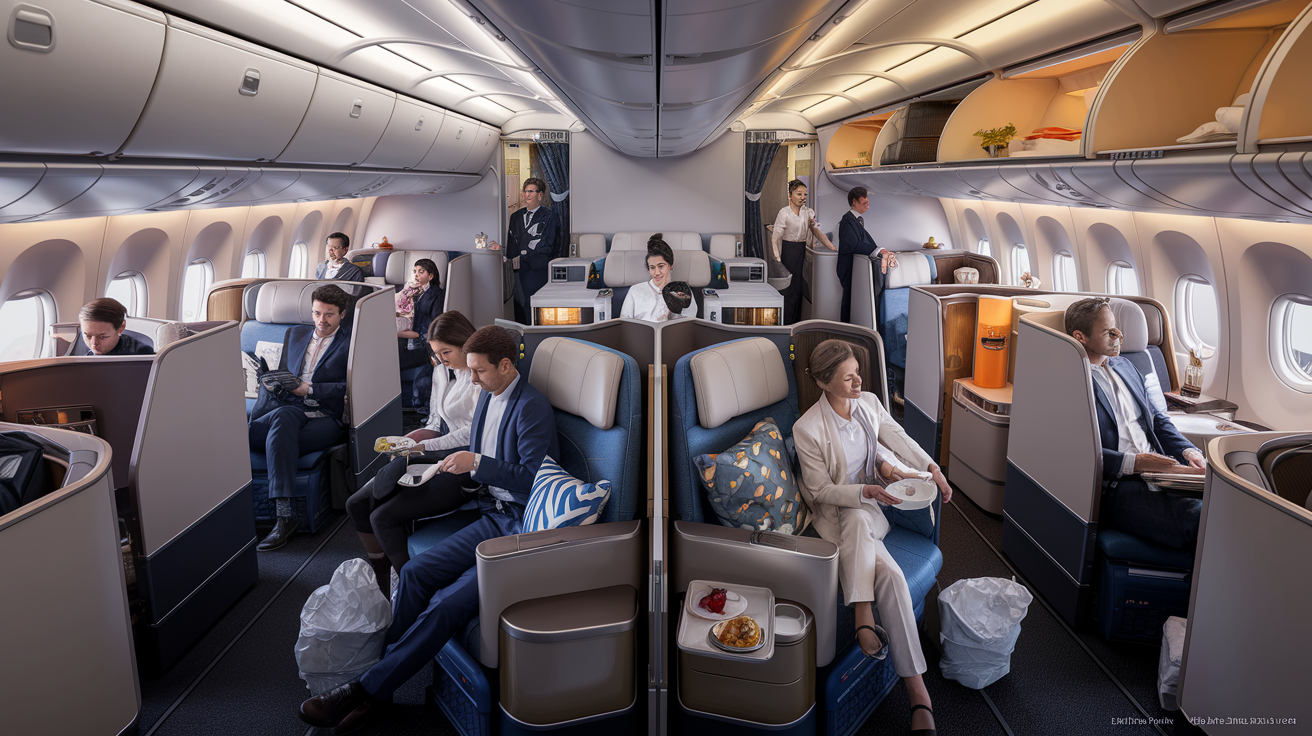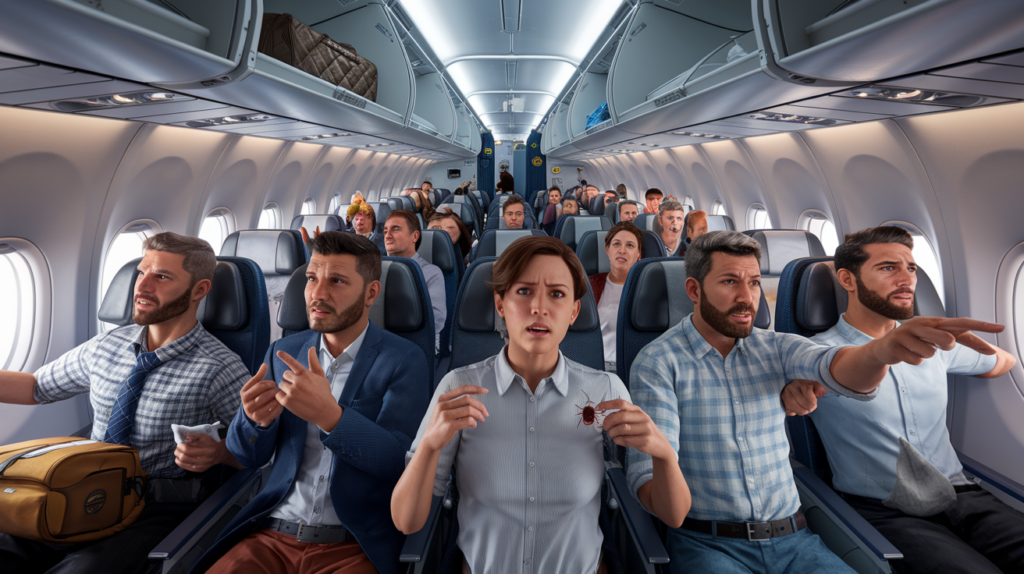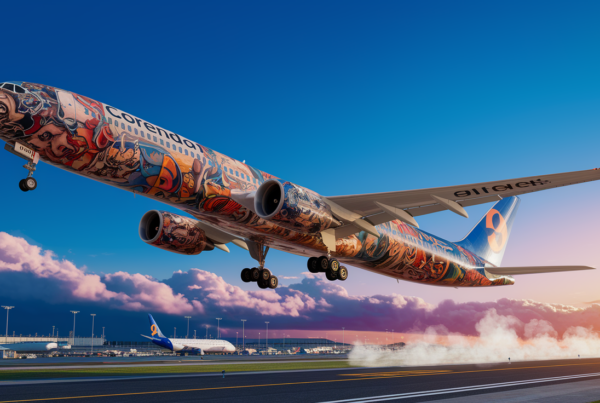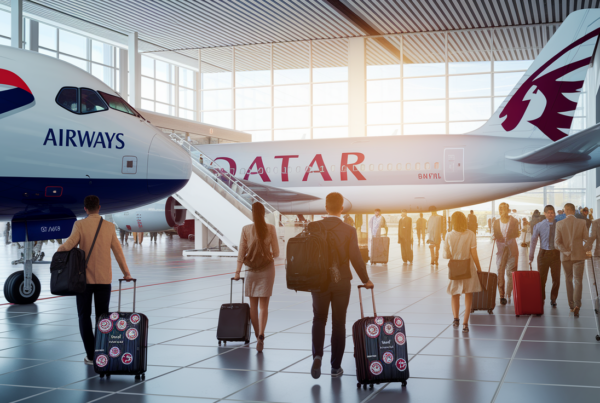The airline SWISS recently stirred up controversy with an advertisement asking passengers in the Economical to be cleaner in the toilets. According to spokeswoman Meike Fuhlrott, there are more passengers in Economy class, which explains the increased use of sanitary facilities. Passengers in Business and First are fewer in number, making it easier to maintain cleanliness. This situation has reinforced the stereotype that Economy class is less hygienic, fuelling the debate on cleanliness standards on board flights.
In mid-air, the debate on cleanliness is becoming as complex as the flight itself. At SWISS, the behavior of Economy Class passengers is rekindling a controversy over the differences with Business and First Class. Human nature and polluting consumer habits clash with the harmony sought on board.
The challenge of numbers: More passengers, more dirt?
SWISS spokeswoman Meike Fuhlrott explains that the majority of passengers travel in Economy class. An implacable logic, which naturally leads to higher use of the toilets in this class. But this raises questions about human behavior and statistical impact. Do more people really mean more mess? It's true that crowds can be a lever for disorganization, but not everyone is convinced that cleanliness is a question of numbers.
Double-edged material comfort
Perhaps the key to the problem lies more in the comfort level offered. In Business and First Class, travelers benefit from increased space and a certain respect for place. These premium classes, adorned with prestigious gadgets and treats such as the intimate SWISS Senses suites planned for 2025, transform the travel environment into a bubble of serenity. But the gap between these oases of tranquility and economic reality is staggering, unconsciously reinforcing behaviors that conform to the available infrastructure.
Swiss cleanliness myths
Switzerland is often praised for its hygienic behavior, but clichés don't always stand up to reality. Is "Swiss cleanliness" an urban legend, or just a facet of the high-end services offered by Swiss companies? In the skies, perception freezes when traces of disorder become visible. Socio-cultural and individual differences stand out, sometimes at the expense of generalities.
Technological and practical solutions for cleaner flying
In response to these challenges, some airlines, such as Air France, are focusing on innovations to maintain their high quality standards and stay in the top tier. Top 10 of the SkyTrax 2024 ranking (see the complete ranking on Flywest). However, various cleanliness incidents still call into question the effectiveness of the systems in place, such as the recent report of bedbugs on certain Turkish Airlines flights (Flywest).
The issue of cleanliness on board aircraft is at the crossroads between individual actions and collective responsibilities. Airlines are constantly innovating to ensure the well-being of all passengers, whatever their class of travel, but individual behavior remains a sensitive issue.

Comparison of in-flight cleanliness habits
| Class | Cleanliness habits |
| Economical | More frequent cleaning required, more passengers. |
| Business | Fewer passengers, more personal space. |
| First | High level of cleanliness, improved cleaning services. |
| Economical | Regular cleanliness instructions. |
| Business | Better cleaning facilities available. |
| First | Minimal use of common areas. |
| Economical | Restricted access to toilets means queues. |
| Business | More regularly cleaned and accessible toilets. |
| First | Virtually private toilets, cleaned after each use. |
On the same theme
Passengers report bedbugs on Turkish Airlines flights
Several passengers traveling with Turkish Airlines in 2024 reported encountering bedbugs during their flights. One American traveler, on a trip from Johannesburg to Istanbul, reported finding the insects on her seat, causing itching and bites...
London Stansted Airport forecasts record passenger numbers of millions by 2040
London Stansted Airport is anticipating an impressive upswing, planning to welcome millions more passengers by 2040. In the past month, it has already recorded an 8.3 % increase in passenger numbers compared with...
Spain's Aena Group confirms its position as the world's leading airport operator, with plans to handle 369 million passengers by 2024. This performance is based on a steady rise in traffic, stimulated by the recovery of the tourism sector. With a management...







